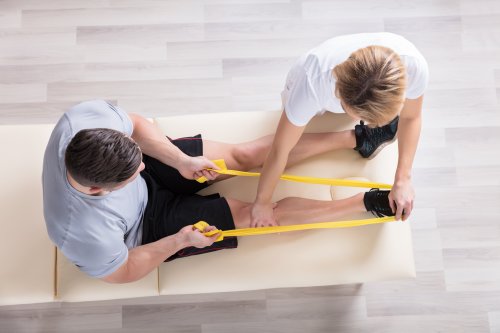You have probably heard some of your friends talking about their ailments, or a famous athlete having physical therapy, physiotherapy, or physio after having an injury or being in an accident. You may also have an unexplained pain in your body and have heard that physio could do the trick to make it go away.
But what do these terms mean and are they all the same thing?
All of the above words that contain the word “physio” refer to the same therapy.
During physiotherapy, a disease, an injury or a deformity is treated by physical methods, such as heat treatment, massage, acupuncture and exercise rather than by drugs or surgeries. The meaning of the word has its roots in the Greek “physio”, which stands for nature, natural, or physical. Therefore, physiotherapy, in a way, means applying natural treatments.
Not only can physiotherapy help restore function and movement when someone is affected by an illness, injury or disability, but it can also improve overall physical health and reduce the risk of illness or injury in the future. And this applies to all ages – from children to elderly people.
Even though physiotherapy is led by trained professionals called physiotherapists, it is a holistic approach to healthcare as it involves the patients directly in their own care.
Physiotherapists help patients make the most of their ability to move and function during the course of their life through movement and by using manual therapy, massages, exercises, education, and advice.
 What is Physiotherapy Used for?
What is Physiotherapy Used for?
Physiotherapy is used to help people overcome a variety of conditions and physical health problems. Physiotherapists use their skill and knowledge in many areas, including orthopaedics, sports, cardio-respiratory injuries, neurology, paediatrics, women’s health, and seniors’ health.
In a nutshell, any healthcare area in which patients could make good use of biomechanics and kinesiology requires the help of a physiotherapist.
1. The most common area where physiotherapy is used is in treating injuries and conditions that affect the bones and joints
2. Physio is key for treating patients who are recovering from surgery. Their treatment usually consists of exercises that aim to increase strength, coordination and balance in order to correct damage to or deformities of the bones or joints. Electrical stimulation or shockwave therapy can also be incorporated into the mechanical force or movement exercises.
3. Physiotherapy is also used to treat people after a heart attack for recovering vital functions.
4. Patients with lung conditions, such as cystic fibrosis, chronic bronchitis, and chronic obstructive pulmonary disease make great advancements with physical therapy. For example, cystic fibrosis is treated by clapping on the patient’s back while they are lying down. This helps with loosening the build-up of mucus in the lungs so it can be coughed up.
The physiotherapists could educate parents of a child with cystic fibrosis how to clear the mucus of their child or teach older patients how to do this themselves.
5. Physiotherapy is used to treat people with conditions that affect the brain and the nervous system. Common neurological illnesses which can be alleviated with physio are multiple sclerosis, stroke, Parkinson’s disease, spina bifida, and cerebral palsy.
6. Children with conditions that affect the bones and muscles visit physiotherapists to get treatments for increasing flexibility, maintaining strength, and preventing joint suffering.
7. Physiotherapy is also extremely helpful with conditions that appear in late life, such as osteoarthritis and osteoporosis, and can help with recovery after hip surgeries.
When People Need to Get Help from a Physiotherapist?
Even though physiotherapy services are usually prescribed by your doctor after an injury or surgery, it doesn’t mean physio can only be used in those cases. It can actually be used to improve your health in many unexpected ways. You may need to get help from a physiotherapist when you are experiencing any of the following.
Sports Injury
Playing sports for a living takes a huge toll on athletes’ bodies. It’s almost impossible to imagine a long-term successful career without continuous physiotherapy treatment.
Advanced sports physio treatments can also vastly improve the overall outlook of a sportsperson suffering from mild or serious injuries – despite all the precaution, serious injuries do happen. If this is the case, the longer you wait after you get in touch with a physio expert, the more you expose yourself to additional complications. Acting quickly is the best solution to prevent further damage. This goes double if you are not a pro since you, most likely, haven’t heard expert advice on how to act after an accident as sports people do.
Sports Taping
Taping with kinesiology tapes, or, shortly kinesio taping, is an effective technique to ease down the pain and inflammation of sports-acquired conditions, such as strain and sprain in the lower and upper extremities, the groin and the lower back, as well as the neck and the shoulders.
Tapes are applied to the injured part, and due to their mechanical support properties, especially their capacity to improve the proprioceptive sense of bodily parts, they help patients coordinate movements better and heal faster.
Continuous Pain after Injury
If the pain does not go away after you have recovered from an injury and the tissues have healed, this means your pain has become chronic. You need physiotherapeutic treatment!
This is especially common with lower back and neck pain, which can be caused by many factors. Physiotherapists will provide a custom-made program with massages and exercises to help you support your affected body part better and stop the injury from happening in the future.
Neck and Back Pain
Neck and back pain is perhaps the most common reason so many people ask for physio. They play a major part – “carry the burden” of workload and stress of everyday activities.
Therefore, it’s important to pay attention when pain calls attention to these parts. Apart from taking your own measures, such as limiting strain and improving posture, you can ask for specialist physio help. Neck and back pain can be a sign of a more serious issue, too, so, it’s best to ask for medical advice if you feel prolonged pain.
Dancing Injuries
Physio for dancers takes care of minor to mild injuries. Most dancers, sooner or later, suffer from a sprained joint, muscle strain, and injuries to the connective tissues which ensue from regular exercise. Dancers actually build their bodies with muscular micro-tears, causing them to grow stronger and more flexible. In a way, dance progress is always associated with injuries that must be healed. Physio can make a big difference for this type of micro-trauma.
Recovery After Surgery
Surgery is accompanied by general weakness of the body and scar tissue. Patients cannot function normally immediately after surgery. Physiotherapy can accelerate the road to health and help you regain normal functions. Most post-surgical physio treatments require specialised personal consultation and care. There is no one-size-fits-all solution.
Casting and Plaster Treatments
Certain injuries require immobilising parts of the body by putting them in casts. Today’s advanced physiotherapeutic aids include waterproof casts to heal fractures as soon as possible and maintain your comfort and hygiene at a high level. For minor wrist injuries and chronic conditions which affect the normal functioning of your hands and palms, you can ask your physiotherapist to present you with braces options.
Loss of Balance
This can be a result of issues with your inner ear, which is the crucial part of your balance system. Problems with the inner ear can lead to a variety of symptoms such as vertigo, dizziness and a general lack of balance. This condition can be very challenging to live with. A physiotherapist can help you with a series of head, neck, and eye exercises to help retrain your nervous system to make up for the inner ear issues.
Desk Pain
If you are stuck sitting at your desk at work all day without regular walks or stretching, you are very likely to experience headaches or backaches.
Our bodies are designed to move, so staying immobile for hours can cause our muscles and joints to strain, causing pain. This is why you need to take regular breaks from the desk in order to move your upper back, head, neck and arms.
Loss of Flexibility and Deteriorated Movement
If you notice you are not as flexible as you used to or you are not moving as easily as before, a physiotherapist can show you a wide range of exercises to strengthen the supporting tissues and relax the muscles, thus increasing your flexibility.
Difficulty Controlling Passing Urine
If you have started to urinate uncontrollably, you are one of the millions who suffer from this condition. It is likely to happen with age and is especially common in women.

 What Are the Benefits of Physiotherapy?
What Are the Benefits of Physiotherapy?
Physiotherapy has proven to be effective and make a great difference to the quality of life of people and their ability to live a fully active and healthy lifestyle. It is one of the most effective and natural ways to promote physical activity and overall health and wellness.
Physiotherapy can prevent injuries, disabilities and conditions from recurring. It is crucial in restoring and maintaining a level of physical function that allows people, especially those with chronic conditions, to live independently.
An overall benefit from physiotherapy is decreased pain along with increased strength and coordination, as well as improved joint mobility and cardio-respiratory functions.
With dedicated and prolonged physio care done in the right way, you can start enjoying your favourite leisure activities at work and at home after weeks and months in discomfort and pain.
*Pro-Fit Physio & Allied Health Centre provides physio services to Revesby, Padstow, Bankstown and surrounding suburbs.




